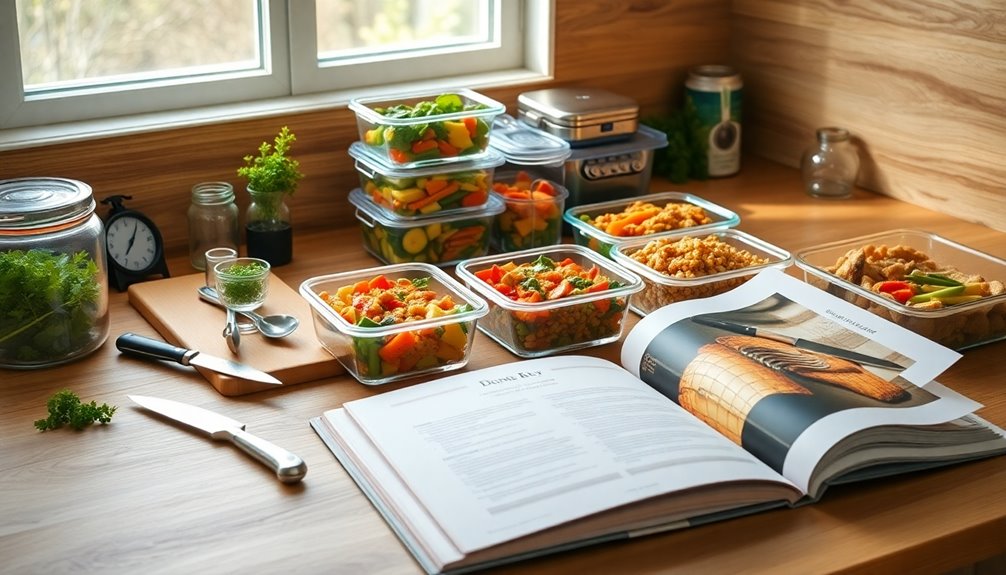Meal prepping can transform your busy weeks into manageable ones. Start by planning your meals ahead; it streamlines grocery shopping and saves time. Choose versatile ingredients that allow for creative swaps. Batch cooking helps you prepare meals in bulk, reducing daily stress. Invest in proper storage containers to keep food fresh longer. Always have ready-to-eat snacks on hand to satisfy cravings. Don't forget to label and date your meals for easy access. Finally, schedule specific prep time each week to build a routine. For more effective strategies on meal prepping, keep exploring essential tips that suit your lifestyle.
Key Takeaways
- Schedule a specific day and time each week for meal prep to establish a consistent routine and minimize distractions.
- Choose versatile ingredients that can be used in multiple recipes to save time and encourage creative cooking.
- Invest in proper storage containers, such as glass or BPA-free plastic, to keep prepped meals fresh and organized.
- Prepare a variety of ready-to-eat snacks to satisfy cravings and maintain portion control throughout the week.
- Use clear labels on prepped items to enhance organization and make meal selection easier during busy days.
Plan Your Meals Ahead
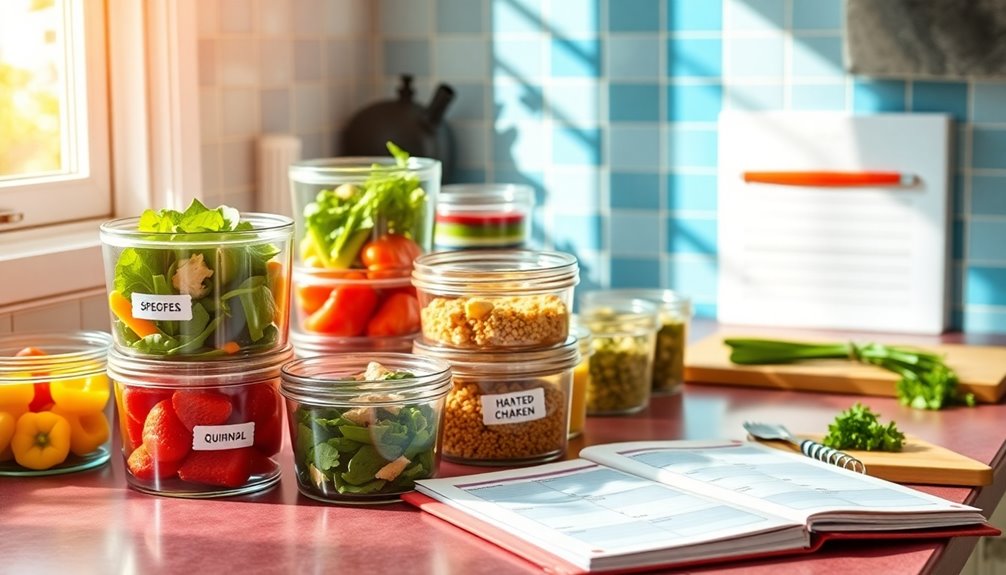
When you take a few moments at the beginning of each week to plan your meals ahead, you set yourself up for success. This simple practice not only streamlines your grocery shopping but also enhances your time management skills throughout the week. By knowing exactly what you'll eat each day, you eliminate the last-minute scramble for meals, reducing stress and saving time.
Start by creating a meal plan. List out the breakfasts, lunches, dinners, and snacks you'd like to enjoy. Aim for a mix of nutrients and flavors to keep things interesting. Once your plan's in place, translate it into a grocery list. This way, you won't impulse buy or forget essential items while shopping, making your trips more efficient.
Next, consider scheduling your grocery shopping for a specific day and time. This consistency helps you build a routine, making it easier to stick to your meal plan. Remember, when you shop with a list, you're more likely to stay focused and avoid unnecessary purchases that can derail your budget and time. Additionally, incorporating a balanced diet can help prevent conditions like fatty liver disease, which is affected by poor eating habits.
Choose Versatile Ingredients
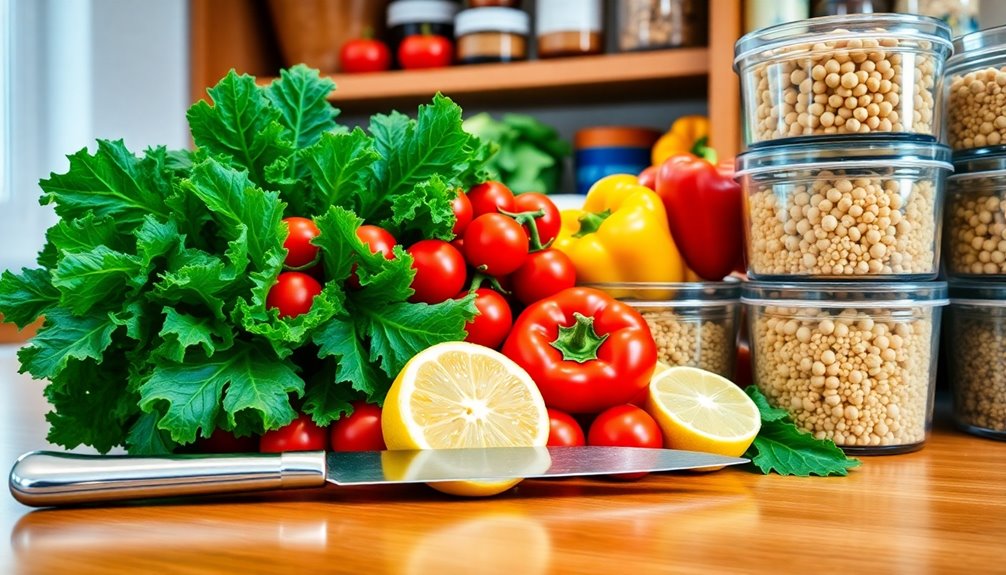
Choosing versatile ingredients can really make a difference in your meal prep efficiency. By selecting items that can be used in a variety of dishes, you streamline your cooking process and minimize waste. Think of staples like quinoa, brown rice, or whole grain pasta. These base ingredients can serve as the foundation for multiple meals throughout the week, allowing you to mix and match with different proteins and vegetables.
Ingredient swaps are also key to flexibility in your kitchen. If a recipe calls for chicken but you have leftover tofu, don't hesitate to make that swap. Both ingredients can be seasoned and cooked similarly, giving you a delicious result without needing a trip to the store. This adaptability not only saves time but also encourages creativity in your meal prep.
You'll find that quick recipes become your best friend when you're using versatile ingredients. For instance, roasted vegetables can pair well with grains, or be tossed into a stir-fry. A simple salad can transform into a hearty wrap by just changing the protein source.
When you embrace versatile ingredients, you create a sense of belonging to a community of home cooks who prioritize practicality and flavor. You're not just preparing meals; you're building a repertoire of quick, satisfying recipes that cater to your lifestyle. Additionally, just as strong glutes are essential for overall body performance, incorporating versatile ingredients can enhance your meal prep effectiveness. So, next time you hit the grocery store, think about how the ingredients you choose can work together in multiple ways to simplify your busy week.
Batch Cook Efficiently
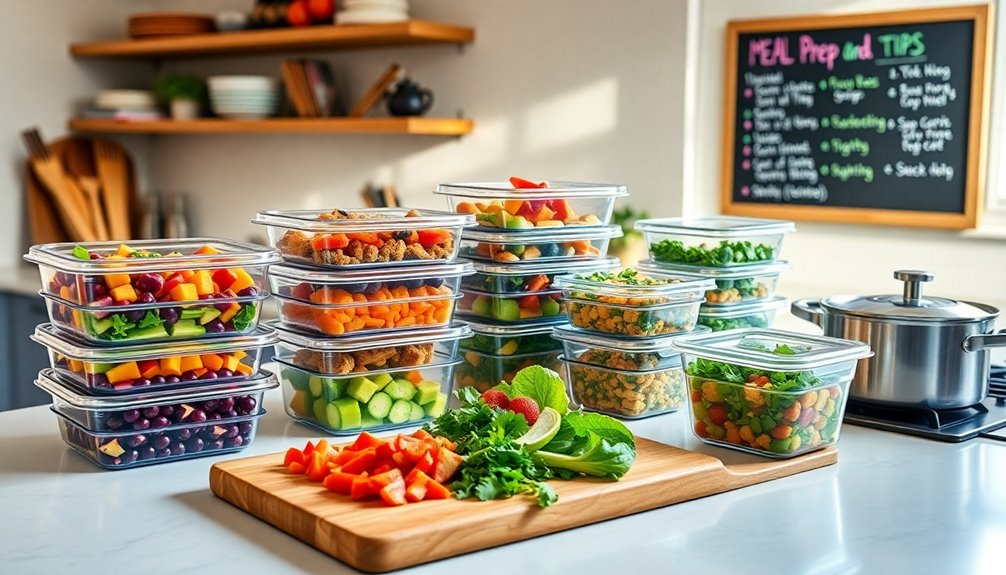
To maximize your meal prep, batch cooking is a game changer. This method not only saves you time but also allows you to create a variety of meals that cater to different tastes. Start by selecting a few core ingredients, focusing on variety. For example, choose proteins like chicken, beans, or tofu, and pair them with different grains and vegetables. This way, you can whip up multiple dishes without feeling repetitive.
Effective time management is essential when batch cooking. Set aside a few hours on the weekend or a designated day to prepare your meals. Begin by washing, chopping, and cooking your ingredients in bulk. Use large pots and pans to speed up the cooking process.
For instance, you can roast a tray of mixed vegetables while simultaneously cooking quinoa and grilling chicken. Recent research shows that effective meal planning can lead to improved overall well-being, making your meal prep even more beneficial.
Once everything is cooked, combine your ingredients in different ways to create a variety of meals for the week. Think grain bowls, stir-fries, or wraps. Not only does this approach keep your meals exciting, but it also helps you avoid the temptation of takeout when you're busy.
Use Proper Storage Containers
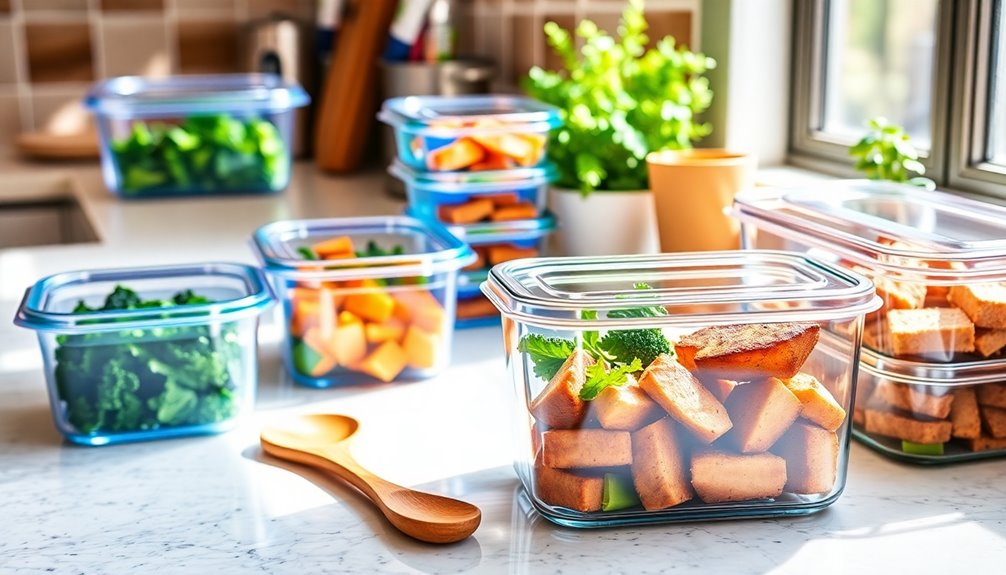
Investing in proper storage containers can greatly enhance your meal prep experience. When you choose the right containers, you not only make organizing your meals easier but also extend their freshness.
Start by considering container sizes. You'll want a variety—small containers for snacks or dressings, medium ones for sides, and larger containers for main dishes. This variety helps you portion meals effectively, reducing food waste and saving you time during the week.
Next, think about material types. Glass containers are excellent for heat retention and durability, making them a favorite for many meal preppers. They're microwave and oven safe, and they don't retain odors like plastic can.
However, if you're looking for lightweight options, BPA-free plastic containers are a good choice. Just make sure they're microwave and dishwasher safe for convenience.
Additionally, check for airtight lids. Airtight containers prevent spills and keep food fresher for longer, so you can enjoy your meals without worrying about spoilage. Incorporating mini bands for workouts into your routine can complement your meal prep efforts by enhancing muscle toning and metabolism.
If you're the kind of person who loves to grab a meal on the go, consider investing in leak-proof containers. They'll save you from messy surprises in your bag.
Keep Snacks Ready
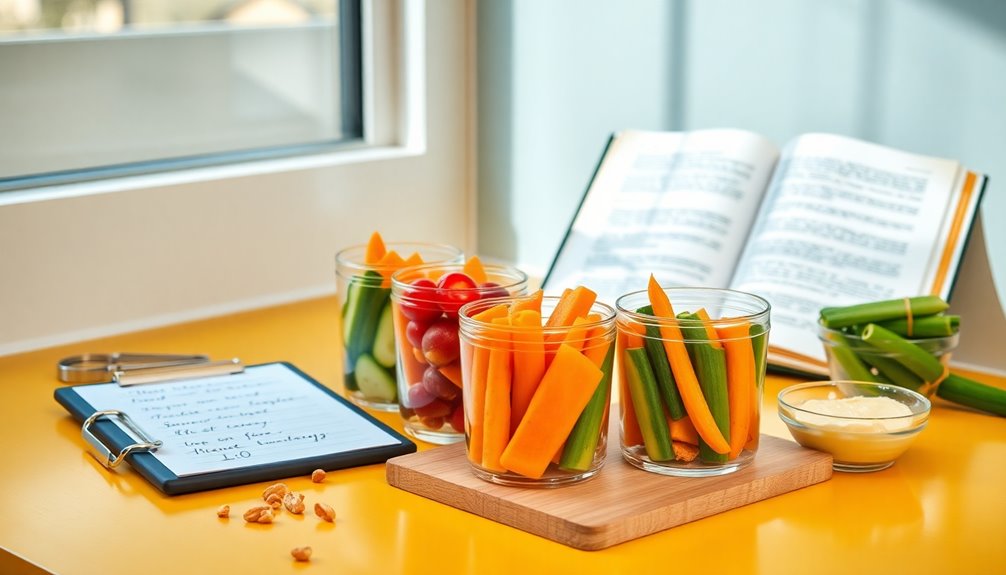
Having the right storage containers sets the stage for effective meal prep, but don't overlook the importance of keeping snacks ready for those busy days. Having a variety of healthy snacks on hand not only satisfies cravings but also helps you maintain portion control, making it easier to stick to your nutrition goals. When you're juggling work, family, and social commitments, reaching for a prepped snack can save you from unhealthy choices.
To keep your snacking game strong, consider prepping a mix of snacks that cater to different cravings. Here are some ideas to inspire you:
- Veggie sticks with hummus: Crunchy carrots, bell peppers, and celery paired with creamy hummus make a revitalizing snack.
- Greek yogurt with berries: This combo is rich in protein and antioxidants, offering a satisfying treat.
- Nuts and dried fruit: A handful of mixed nuts and dried fruit can give you that energy boost you need. Incorporating whole-food protein into your snacks can enhance satiety and help manage hunger effectively.
Label and Date Everything
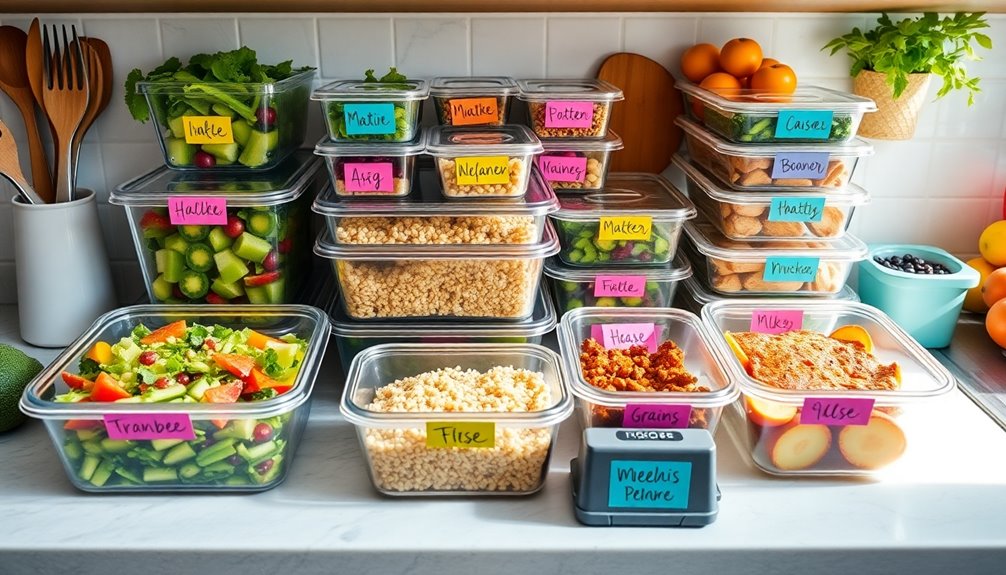
A well-organized meal prep routine hinges on one important practice: labeling and dating everything. This simple step can save you time and reduce food waste, making your busy weeks feel more manageable.
When you take a moment to label your containers with the contents and the date you prepared them, you enhance your inventory organization. You'll always know what you have on hand and when it needs to be consumed, which is essential for staying on top of your meal prep game.
Moreover, labeling allows for easy recipe customization. If you find yourself with leftover ingredients, a quick glance at your labeled items can spark creative meal ideas. You can mix and match to create new dishes without the hassle of rummaging through unmarked containers. It encourages experimentation while helping you stay within the bounds of what you've already prepped.
Using clear labels also fosters a sense of community in your kitchen. You can share your meal prep with family or roommates, knowing they'll understand what's available and how fresh it is. This transparency can lead to collective meal planning, where everyone contributes and benefits from each other's efforts.
In essence, labeling and dating your meal prep items not only streamlines your inventory organization but also opens the door to exciting recipe customization. By adopting this practice, you're setting yourself up for success during your busy weeks, ensuring that delicious, wholesome meals are always within reach. Additionally, maintaining an organized meal prep can support your overall health by promoting increased metabolism and making it easier to stick to your dietary goals.
Schedule Prep Time
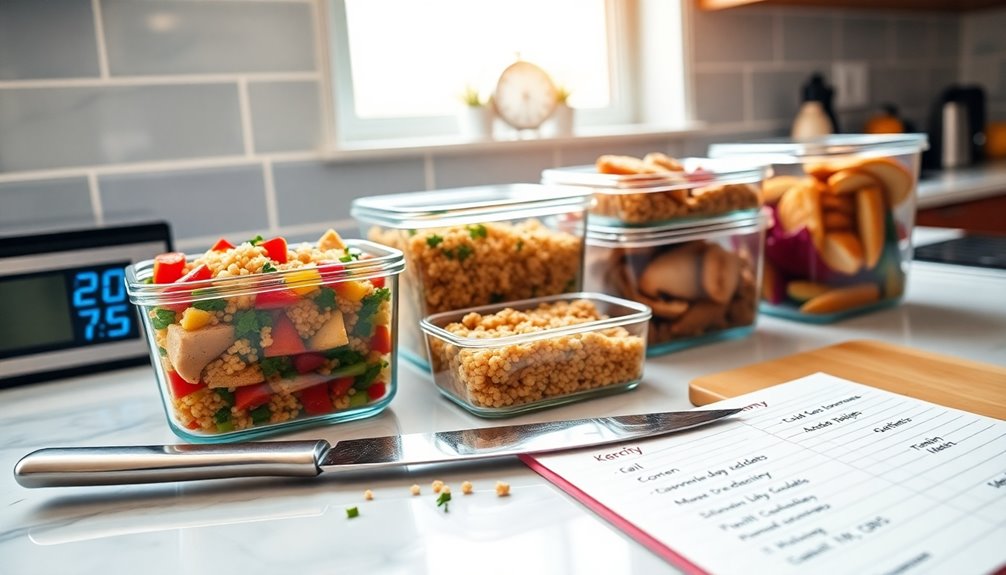
Setting aside specific time for meal prep each week can transform your cooking routine and make your busy schedule feel more manageable. By scheduling your prep time, you're not just organizing your kitchen; you're also enhancing your time management skills, making it easier to stick to your meal planning goals.
To make the most of your meal prep sessions, consider these strategies:
- Choose a consistent day: Pick a day that fits your schedule—perhaps Sunday afternoons or Wednesday evenings—so it becomes a routine.
- Designate a time block: Set aside at least 1-2 hours during which you can focus solely on prep. This helps keep distractions at bay.
- Gather your tools: Before you start, make sure your kitchen is organized with everything you'll need—cutting boards, knives, storage containers, and ingredients—ready to go.
Implementing these prep strategies not only saves you time during the week but also fosters a sense of community. Additionally, consider incorporating Half Day Keto principles into your meal prep to align with your health goals. You might even invite friends or family to join in; meal prepping together can turn into a fun, shared experience, reinforcing a sense of belonging.
Frequently Asked Questions
How Do I Stay Motivated to Meal Prep Weekly?
To stay motivated for weekly meal prep, focus on meal planning and time management. Set aside a specific day and time each week to plan your meals, making it a routine you look forward to.
Try batch cooking your favorite dishes, so you've got delicious options ready to go.
Consider sharing your meal prep journey with friends or family; that sense of belonging can boost your motivation and make prepping more enjoyable.
Can I Meal Prep for Special Diets Like Keto or Vegan?
Absolutely, you can meal prep for special diets like keto or vegan! Start by researching meal prep substitutes that fit your dietary needs.
For keto, focus on low-carb veggies and healthy fats; for vegan, prioritize plant-based proteins and whole grains.
Use special diet hacks, like batch cooking or freezing meals, to save time. With a bit of planning, you'll create satisfying meals that align with your lifestyle and keep you feeling great!
What Tools Are Essential for Effective Meal Prepping?
Meal prepping's like crafting a delicious symphony; the right tools harmonize your efforts. For effective meal prepping, you'll need sturdy storage containers to keep your meals fresh and organized.
Investing in a meal planner also helps streamline your process, allowing you to map out your week efficiently. These essential tools not only simplify your routine but also foster a sense of belonging in your culinary journey, making every meal feel special.
How Do I Prevent Food Waste During Meal Prep?
To prevent food waste during meal prep, focus on effective food storage and portion control. Use airtight containers to keep leftovers fresh longer, and label them with dates to avoid forgetting about them.
When prepping, measure out portions to guarantee you only cook what you'll eat. By planning your meals and shopping wisely, you can minimize excess ingredients and enjoy your food without waste, fostering a sense of belonging in your healthy eating journey.
Are There Any Quick Meal Prep Recipes for Beginners?
If you're new to meal prep, try beginner-friendly recipes like overnight oats, stir-fried veggies, or sheet pan chicken. These dishes require minimal ingredients and time, making them perfect for busy schedules.
Use time-saving tips like chopping veggies in advance or cooking larger portions to freeze for later. You'll feel accomplished as you create healthy meals without the stress. Plus, you'll save money and reduce food waste, creating a sense of belonging in your kitchen.
Conclusion
By following these meal prep tips, you'll transform your busy weeks from chaotic to seamless, making you feel like a culinary superhero. Planning ahead, choosing versatile ingredients, and batch cooking can save you time and stress, allowing you to enjoy healthier meals without the hassle. So, immerse yourself in meal prepping, and watch as it revolutionizes your routine, ensuring you always have delicious options at your fingertips. You'll wonder how you ever managed without it!

